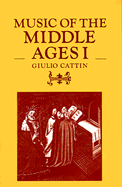Book contents
- Frontmatter
- Contents
- Abbreviations
- I THE ORIGINS OF CHRISTIAN WORSHIP; LITURGY AND CHANT
- II CHRISTIAN CHANT AT BYZANTIUM AND IN THE WESTERN CHURCHES
- III GREGORIAN CHANT
- IV LITURGICO-MUSICAL INNOVATIONS OF THE NINTH AND TENTH CENTURIES AND THEIR DEVELOPMENT; SECULAR MONODY IN LATIN
- V MONODY IN VERNACULAR LANGUAGES; INSTRUMENTS; THE ARS MUSICA
- READINGS
- Glossary
- Notes
- Bibliography
- Index
READINGS
Published online by Cambridge University Press: 04 April 2011
- Frontmatter
- Contents
- Abbreviations
- I THE ORIGINS OF CHRISTIAN WORSHIP; LITURGY AND CHANT
- II CHRISTIAN CHANT AT BYZANTIUM AND IN THE WESTERN CHURCHES
- III GREGORIAN CHANT
- IV LITURGICO-MUSICAL INNOVATIONS OF THE NINTH AND TENTH CENTURIES AND THEIR DEVELOPMENT; SECULAR MONODY IN LATIN
- V MONODY IN VERNACULAR LANGUAGES; INSTRUMENTS; THE ARS MUSICA
- READINGS
- Glossary
- Notes
- Bibliography
- Index
Summary
The jubilus in St Augustine
Born at Tagaste in Numidia in 354, Aurelius Augustinus came to Milan in 384 to teach rhetoric. His eager search for truth had earlier led him to study philosophy and Manichaean doctrines, but at Milan he came under the influence of St Ambrose, who baptised him in 387. Augustine returned to Africa and became Bishop of Hippo, in present-day Algeria, where he died in 430 during the siege of the city by the Vandals. The penetration of his thought, the wide range of his interests and his many writings make him one of the greatest of the Church Fathers; the development of Christian doctrine in the West was profoundly affected by his genius.
There are many references to music in his writings, most of which are of great interest. They include the autobiographical details of the Confessions, as well as valuable remarks in his masterpiece, the De civitate Dei. The treatise De musica considers the problems of metrics and versification. The Enarrationes in Psalmos and other collections of sermons contain a number of references to the liturgical and musical practices of Augustine's day, especially in the commentaries on Biblical passages, where the author sees in music the perfect instrument of the praise of God and of the elevation of the soul to the sphere of the infinite and ineffable. It is from such a context that the passage below is taken. In it Augustine sketches the aesthetics and mystical meaning of the jubilus, one of the earliest forms of Christian chant. […]
- Type
- Chapter
- Information
- Music of the Middle Ages , pp. 162 - 189Publisher: Cambridge University PressPrint publication year: 1984
- 1
- Cited by



